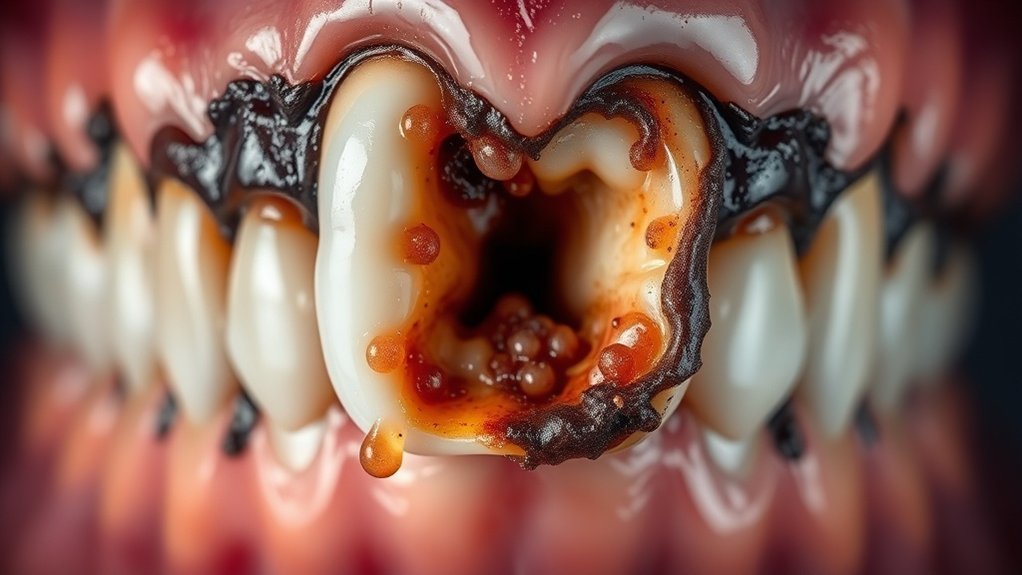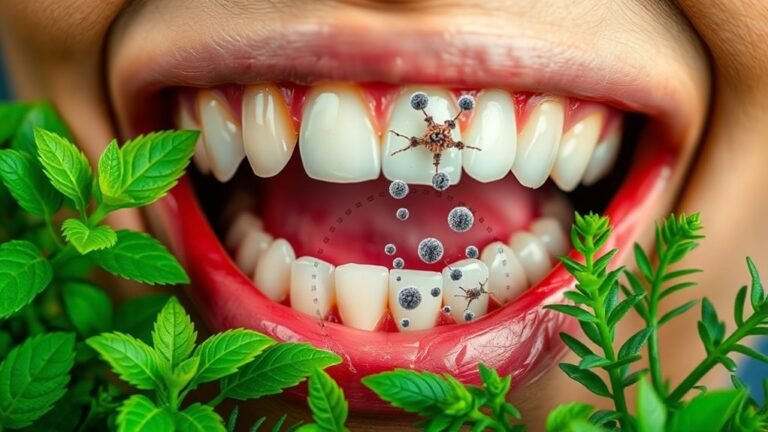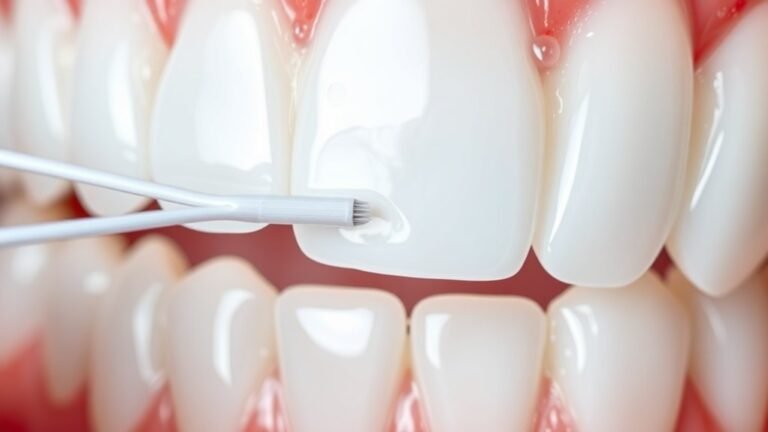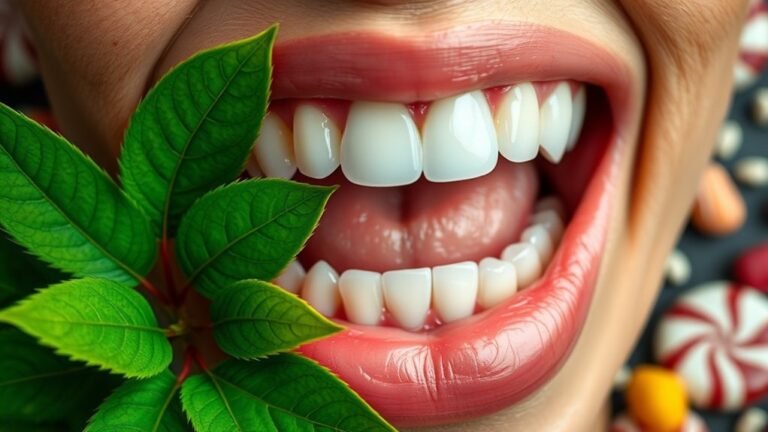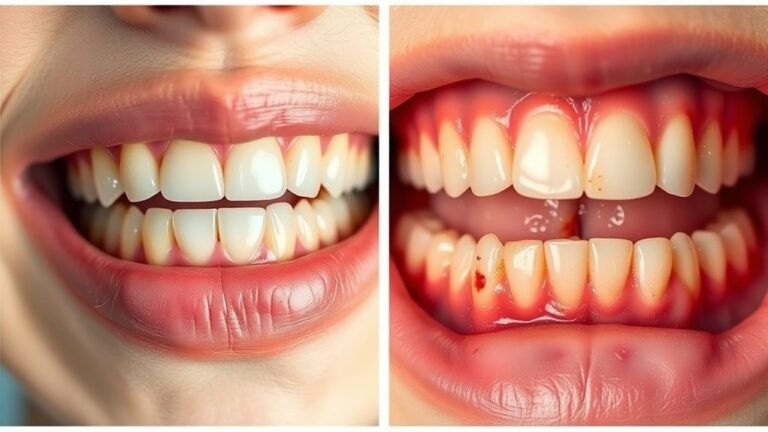Poor Oral Hygiene Increases Risk of Microbial Imbalance and Chronic Infections
Poor oral hygiene greatly increases your risk of microbial imbalance and chronic infections. When you neglect brushing and flossing, harmful bacteria thrive, leading to plaque buildup that can enter the bloodstream. This results in inflammation and can trigger systemic diseases, including diabetes and cardiovascular issues. Maintaining good oral care practices helps foster beneficial bacteria and prevents these complications. Discover how you can improve your oral hygiene routine to safeguard your health even further.
Key Takeaways
- Poor oral hygiene leads to plaque buildup, creating an environment for harmful bacteria to thrive and disrupt microbial balance.
- Harmful bacteria produce acids that can damage teeth and gums, increasing the risk of cavities and gum disease.
- Chronic oral infections can allow bacteria to enter the bloodstream, contributing to systemic diseases like diabetes and cardiovascular issues.
- A disrupted microbial balance from neglecting oral hygiene exacerbates inflammatory responses, worsening health conditions.
- Regular dental check-ups and effective oral care practices can prevent microbial imbalances and reduce the risk of chronic infections.
Understanding Oral Hygiene and Its Importance
Oral hygiene is the practice of maintaining clean and healthy teeth and gums, and it plays a significant role in overall health. When you neglect dental care, poor oral hygiene can lead to plaque accumulation, increasing the risk of cavities and gum disease. Plaque, a sticky film of bacteria, forms on your teeth and can harden into tartar if not removed. This process not only jeopardizes your dental health but also contributes to systemic issues, affecting your heart and other organs. Regular brushing, flossing, and professional cleanings are essential to prevent plaque buildup. By prioritizing your oral hygiene, you’re not just preserving your smile; you’re actively safeguarding your overall well-being. Don’t underestimate the importance of maintaining your oral health—it’s imperative.
The Role of Bacteria in Oral Health
Bacteria play an important role in your oral health, with both beneficial and harmful strains present in your mouth. While beneficial oral bacteria help maintain a balanced ecosystem, harmful pathogens can lead to dental issues if they proliferate. Understanding this microbial balance is essential for preventing oral diseases and promoting overall wellness.
Beneficial Oral Bacteria
While many people associate bacteria with dental issues like cavities and gum disease, a significant number of these microorganisms actually play an essential role in maintaining oral health. Beneficial oral bacteria help establish a balanced microbial environment in your mouth, which is vital for preventing microbial imbalance. These good bacteria can inhibit the growth of harmful pathogens and contribute to a robust immune response, protecting your gums and teeth from infections. They aid in the digestion of food and the breakdown of sugars, reducing the risk of plaque formation. By maintaining proper oral hygiene and supporting these beneficial bacteria, you can foster a healthier oral ecosystem, ultimately reducing your risk of chronic infections and enhancing your overall health.
Harmful Pathogens Impact
When harmful pathogens take hold in your mouth, they can disrupt the delicate balance of oral health, leading to a host of issues such as cavities, gum disease, and bad breath. These pathogens create a biofilm, which fosters chronic infections and makes it difficult for your immune system to combat them. As plaque builds up, it provides a protective environment for these harmful bacteria, allowing them to thrive and multiply. This imbalance can trigger inflammation and further damage your gums and teeth. Furthermore, the toxins released by these pathogens contribute to systemic health problems, underscoring the critical need for maintaining proper oral hygiene. Regular brushing and flossing can help keep these harmful pathogens at bay and promote a healthier mouth.
Microbial Balance Importance
Maintaining a balanced microbial environment in your mouth is essential for ideal oral health. A diverse community of bacteria supports various functions, such as digestion and immune defense. Beneficial bacteria help inhibit the growth of harmful pathogens, preventing infections and conditions like gum disease and tooth decay. However, poor oral hygiene can disrupt this balance, allowing pathogenic bacteria to flourish. This imbalance leads to chronic inflammation and systemic health issues. Regular brushing, flossing, and professional cleanings are vital in promoting a healthy microbial population. By prioritizing oral hygiene, you can maintain a harmonious environment that enhances not just your oral health but overall well-being, minimizing the risk of chronic infections linked to microbial imbalances.
How Poor Oral Hygiene Affects Microbial Balance
Poor oral hygiene greatly disrupts the delicate microbial balance in your mouth, leading to an overgrowth of harmful bacteria. When you neglect regular brushing and flossing, food particles and plaque accumulate, providing a breeding ground for pathogens. This imbalance can cause various issues, including:
Neglecting oral hygiene disrupts your mouth’s microbial balance, allowing harmful bacteria to thrive and cause serious dental issues.
- Increased risk of cavities: Harmful bacteria produce acids that erode tooth enamel.
- Gum disease development: Plaque buildup triggers inflammation, leading to gingivitis or periodontitis.
- Bad breath: The proliferation of bacteria can result in persistent halitosis.
The Link Between Oral Health and Systemic Diseases
The health of your mouth doesn’t just affect your teeth and gums; it can also have considerable implications for your overall health. Poor oral hygiene can lead to the proliferation of harmful bacteria, which may enter your bloodstream and contribute to systemic diseases. Research indicates a strong link between periodontal disease and conditions such as diabetes, cardiovascular disease, and respiratory infections. Inflammation from oral infections can exacerbate existing health issues, making management more challenging. Additionally, the mouth serves as a gateway for pathogens, increasing the risk of infections in other body systems. Prioritizing oral health isn’t just about maintaining a bright smile; it’s essential for your long-term well-being and can considerably reduce your risk of developing serious health complications.
Common Chronic Infections Linked to Oral Hygiene
Poor oral hygiene can lead to several chronic infections that greatly impact your overall health. Gum disease, for instance, is closely linked to respiratory infections and can even affect cardiovascular health. By understanding these connections, you can take proactive steps to improve your oral hygiene and reduce your risk.
Gum Disease Connection
While many may underestimate the impact of oral hygiene on overall health, research increasingly shows a strong connection between gum disease and various chronic infections. Poor gum health allows harmful bacteria to thrive, potentially leading to systemic issues.
Consider these common chronic infections linked to gum disease:
- Cardiovascular disease: Bacteria from gum infections can enter the bloodstream, contributing to heart problems.
- Diabetes complications: Gum disease can complicate blood sugar control, worsening diabetic conditions.
- Pregnancy complications: Infected gums may be linked to preterm births and low birth weight.
Maintaining good oral hygiene is essential not only for your teeth but also for reducing your risk of these serious health issues. Regular dental check-ups and proper care can make a significant difference.
Respiratory Infections Risk
Maintaining good oral hygiene is essential, as neglecting it can increase your risk of respiratory infections. Bacteria from periodontal disease can enter your bloodstream and reach your lungs, leading to infections such as pneumonia. When you don’t brush and floss regularly, harmful microbes can thrive in your mouth, creating an environment conducive to respiratory pathogens. Studies show that individuals with poor oral health are more susceptible to chronic respiratory conditions, as their immune systems become overwhelmed by the influx of harmful bacteria. This microbial imbalance not only affects your mouth but also compromises your respiratory health. Thus, by keeping your teeth and gums healthy, you’re not just protecting your smile but also reducing the likelihood of serious respiratory infections.
Cardiovascular Health Impact
Oral hygiene directly influences cardiovascular health, as bacteria from the mouth can enter the bloodstream and contribute to chronic infections. Poor oral hygiene can lead to conditions that increase your risk of heart disease and other cardiovascular issues. Here are some common chronic infections linked to oral hygiene:
- Endocarditis: Infection of the heart’s inner lining, often caused by bacteria from the mouth.
- Atherosclerosis: Inflammation from oral bacteria can accelerate plaque buildup in arteries.
- Diabetes: Gum disease can worsen blood sugar control, increasing cardiovascular risks.
Maintaining good oral hygiene is essential not only for your teeth but also for your heart. Regular brushing, flossing, and dental check-ups can greatly reduce your risk of these serious health issues.
The Impact of Gum Disease on Overall Health
Gum disease, often overlooked, can considerably affect your overall health beyond just your mouth. The inflammation caused by periodontitis can release harmful bacteria into your bloodstream, leading to systemic issues. Research shows a strong link between gum disease and conditions like diabetes, respiratory diseases, and even Alzheimer’s. When your body fights the infection in your gums, it triggers inflammatory responses that may worsen these chronic conditions. Additionally, gum disease can exacerbate cardiovascular problems by promoting artery inflammation and plaque buildup. This systemic impact highlights the importance of addressing gum disease not just for oral health, but for your overall well-being. Ignoring gum disease can result in serious health consequences that extend well beyond your dental hygiene.
Strategies for Maintaining Good Oral Hygiene
Good dental hygiene plays a pivotal role in preventing gum disease and its associated health risks. To maintain good oral hygiene, you should adopt several effective strategies:
Good dental hygiene is essential for preventing gum disease and its related health issues.
- Brush twice daily: Use fluoride toothpaste and a soft-bristled toothbrush. Make sure to brush for at least two minutes, focusing on all tooth surfaces.
- Floss daily: Flossing removes plaque and food particles between teeth that brushing alone may miss. It’s essential for preventing gum disease.
- Limit sugary foods: Reducing sugar intake helps prevent plaque buildup. Opt for healthier snacks and drink plenty of water.
The Importance of Regular Dental Check-ups
Regular dental check-ups are essential for catching potential issues early, which can save you from more serious problems down the line. During these visits, professional cleanings remove plaque and tartar buildup that regular brushing may miss, promoting better oral health. By prioritizing these appointments, you’re investing in your long-term dental care.
Early Detection of Issues
Routine dental check-ups are essential for identifying early signs of oral health issues before they escalate into more serious problems. By attending these appointments regularly, you not only maintain your oral hygiene but also gain valuable insights into your dental health.
Consider the following benefits of early detection:
- Identifying cavities: Catching decay early can save your teeth from more extensive treatment.
- Monitoring gum health: Early signs of gum disease can be treated effectively, preventing tooth loss.
- Assessing oral cancer risks: Regular check-ups allow for the timely detection of any abnormal lesions or growths.
Professional Cleaning Benefits
Maintaining oral health goes beyond daily brushing and flossing; it also involves the essential step of professional dental cleanings. These cleanings eliminate plaque and tartar buildup that regular brushing can miss, considerably reducing your risk of gum disease and cavities. During a professional cleaning, dental hygienists also assess your oral health, allowing for early detection of potential issues like decay or oral cancer. This proactive approach helps you avoid more extensive treatments down the line. Additionally, professional cleanings can improve your breath and enhance the overall aesthetics of your smile. By scheduling regular check-ups, you guarantee that your oral health remains ideal, supporting both your dental and overall well-being. Don’t underestimate the power of professional care in your oral hygiene routine.
Educating Children on Oral Hygiene Practices
How can you guarantee your child develops healthy oral hygiene habits? Start by making oral care fun and engaging. Children are more likely to adopt routines when they enjoy them. Here are three effective strategies:
- Create a Routine: Establish a consistent brushing schedule, ideally twice a day, to instill discipline.
- Use Proper Tools: Provide a child-sized toothbrush and fluoride toothpaste to assure effective cleaning and safety.
- Lead by Example: Demonstrate your own oral hygiene practices; children often mimic adults, making your habits influential.
Encouraging your child to participate in their dental care will help them understand its importance. With your guidance, they’ll be well on their way to maintaining a healthy smile.
The Long-term Benefits of Good Oral Care
Good oral care can yield significant long-term benefits that extend beyond just a bright smile. By maintaining proper dental hygiene, you reduce the risk of periodontal disease, which can lead to tooth loss and systemic health issues. Regular brushing and flossing help prevent cavities and the need for costly dental procedures. Additionally, good oral health contributes to improved digestion, as it aids in the breakdown of food. It also enhances your overall well-being by reducing inflammation and lowering the risk of chronic diseases such as heart disease and diabetes. Staying proactive about your oral hygiene can boost your confidence, improve your quality of life, and ultimately save you time and money on dental treatments in the future.
Frequently Asked Questions
Can Poor Oral Hygiene Affect My Mental Health?
Yes, poor oral hygiene can affect your mental health. Inadequate dental care may lead to discomfort, pain, and self-esteem issues, which can contribute to anxiety and depression, impacting your overall well-being and quality of life.
How Does Diet Influence Oral Microbial Balance?
When it comes to your oral health, you are what you eat. A balanced diet, rich in fiber and low in sugar, helps maintain microbial balance, supporting beneficial bacteria while minimizing harmful ones that cause issues.
Are There Specific Symptoms of Microbial Imbalance?
You might notice symptoms like bad breath, gum inflammation, tooth sensitivity, or persistent bad taste if there’s a microbial imbalance. These signs indicate an underlying issue that needs addressing to maintain your oral health effectively.
What Natural Remedies Can Improve Oral Hygiene?
Incorporating activated charcoal, coconut oil pulling, and herbal rinses like sage or peppermint can enhance your oral hygiene. Regularly brushing and flossing, along with these natural remedies, keeps your mouth healthy and fresh.
How Does Smoking Impact Oral Health and Hygiene?
Smoking damages your gums, reduces blood flow, and increases plaque buildup, leading to gum disease and tooth decay. It also impairs your ability to heal, making it harder for your mouth to maintain good health.
Conclusion
To summarize, neglecting your oral hygiene can lead to a chaotic microbial imbalance, much like a computer without antivirus software. By maintaining good oral care practices, you’re not just protecting your teeth but also reducing the risk of chronic infections and systemic diseases. Regular dental check-ups and educating children on these habits are essential. Prioritizing oral health today fosters long-term benefits, ensuring you keep your smile—and overall health—running smoothly for years to come.
